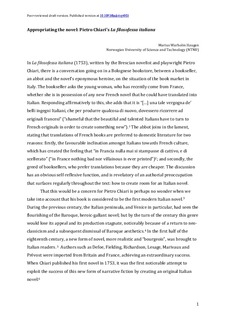Appropriating the Novel: Pietro Chiari's La filosofessa italiana
Journal article, Peer reviewed
Permanent lenke
http://hdl.handle.net/11250/2392662Utgivelsesdato
2015-03-27Metadata
Vis full innførselSamlinger
Sammendrag
This article argues that Pietro Chiari's La filosofessa italiana (1753), regarded as the first modern Italian novel, constitutes a project of appropriation of French and British novelistic models. Pietro Chiari is seen manoeuvring his text in a field of conflicting interests, between a readership that seems insatiable for foreign novels, and a cultural élite hostile towards the genre as well as towards French cultural domination. The appropriative project is inscribed into the novel itself through a series of self-reflexive and intertextual motifs, developed in the paratexts as well as in the main text. The history of the protagonist's quest for her true identity becomes a metaphorical account of the attempt to establish an autonomous position for the Italian novel. Through the analysis of this metaphorical relationship, it becomes clear how the novel negotiates its position between dependence on, and liberation from, the hypotexts and the tradition they represent.
